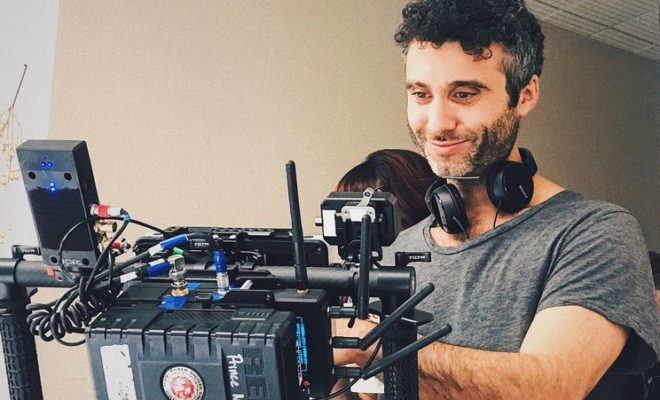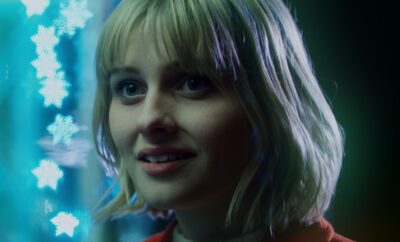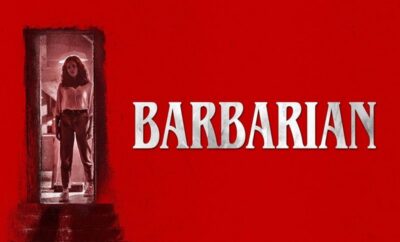
Interviews
Gille Klabin – The Wave
By: Lisa Steinberg
Q) When you first heard about this film, then subsequently began to dive more into the script, what about the story or the project itself really resonated with you? And what ultimately reinforced your decision to be take on The Wave as your directorial debut?
A) The main aspects that really drew me in were the murky ethical waters that the character of Frank (Justin Long) wades through. This wasn’t someone who was outwardly “bad,” but rather a person trying to navigate that various societal structures that we all have to navigate. Yes, he takes action that has a terrible fallout but it’s never malicious. He’s just doing his job well. This ethical messiness spoke to my own difficultly in wrapping my head around morality in this world. I also loved the concept of a nihilist-leaning universe exacting karmic balance on people who have to come to terms with a simple reality, that it isn’t always about them. On top of all these philosophical aspects, I felt the film never lost track of the most important facet; being entertaining. I always dreamed of making a movie that had a message to it, but I firmly believe you’ll only ever spark conversation with your audience if you make the effort to entertain them.
Q) How did working on this movie really push your boundaries as a filmmaker?
A) Well, in brief, it pushed me in every way. My background has been entirely low budget music videos with brief windows of commercial work, so I was prepared to work on a tight budget and try to shoot things in an innovative fashion. I’d never made something so big and shot for so long, but I’ve worked on plenty of films in different departments. I treated my crew in the way I always wished I’d been treated and showed up as prepared as I possibly could. For example, creating an animatic of the entire movie beforehand so people could see a 2D version of the film before we even showed up. The shoot was amazing and I felt like I was working with a tight family unit. Everyone believed in the movie and its message so there was a great energy. I suppose the bigger challenge was the sheer timeline of it all. I’ve given roughly five years of my life to this film, and that takes a lot of getting up every day and telling yourself that it’s all a worthwhile long-game.
Q) When mapping out the film, how did your vision and the need to adapt as you created compare and contrast? Especially with two talents as gifted in physical comedy like Donald Faison and Justin Long.
A) We showed up as technically prepared as possible, everything that wasn’t going to be dictated organically by circumstance was intricately planned out. I did this so that I could afford the freedom (relatively) to my actors to give us the humanity they bring to the table. Carl [W. Lucas] wrote such a perfect script to shoot on a small budget that it allowed us to really be on top of it even without the money you’d expect to have. There are only forty-eight scenes in the film and eleven locations. It’s a tight little unit. These actors came in and breathed life into the characters in ways we’d never imagined, but they’re all such seasoned pros that they managed to do this all in the sandbox we created. It’s tough to be free as an actor when there are articulated camera moves and specific timings, but this cast gave me more than I ever dreamed of and always worked in tandem with the more technical aspects of filmmaking.
Q) How much did you and writer/producer Carl Lucas collaborate in spending breaking down the script and plotting out what we end up seeing on screen?
A) Carl opened the door to me creatively from the start. He wrote this script with me in mind and based scene transitions on stuff I told him I could do. He showed a belief in me YEARS before I had earned that trust. My pursuit was always to simply make the best version of this film possible within our means and Carl felt the same way. We have been partners in this from the get go and I’m forever in his debt for making this all happen.
Q) The cinematography of the film as well is tremendously well done. It’s an amazing added element that adds to the back and forth of the reality and Sci Fi fantasy aspects. Can you talk about how this helps play into the themes and comedic interplay of the movie?
A) I wanted to capture every scene in a manner that worked with where Frank was it in the story. Every camera move is meant to create a feeling that propels us forward in Frank’s shoes. I worked with my longtime collaborator/DP Aaron Grasso. We’ve been making things together for ten years and always push each other to out-do our expectations. Nothing gets Aaron more excited than hearing, “No, we can’t do that.” It just makes him have to prove you wrong and, when it comes to shooting things better than we had hoped for, it’s an incredibly good character trait to have. As I said, we had the whole animatic to go off but Aaron would come in and elevate the shots higher, pushing for more dynamic moves, losing cuts where possible, just generally pushing the entire production to be more ambitious while not eviscerating the budget or crew.
Q) How did you use the angles to play up the balance of action, humor, and emotion on screen?
A) I could nerd-out here for paragraphs. Suffice to say, every scene was shot with intention. Take, for example, the scene when Frank is rushing around the house brushing his teeth. The reason we kept one shot going was so that we could live in the undulations of the scene and never lose that sense of urgency. I wanted Frank running up to and away from camera a lot, like we were yo-yo-ing in and out with him as he tried to juggle the myriad of stressful things he was dealing with. When we figured out how to come over the stairs without cutting, it became a great opportunity for us to sink towards Cheryl (Sarah Minnich) as she fills Frank’s world with her shouting and the overwhelming details of her story. I wanted us to be sinking into it in the same way Frank was. Then, we pause for a breath and then we’re off again. Throughout the scene we are breathing in and out with Frank, understanding things as he understands them and rising about with him as he tries to manage. This builds and builds and keeps us tense as hell (with extra help from Eldad Guetta’s tense score) until the final transition to the office. Only with that insane build up does the shift of location have such weight and I hope that audiences feel that absolute shock and shift in tone as Frank does.
Q) What was the most challenging aspect for you?
A) Again, I would just have to say the sheer timescale of it all. I am a passionate nerd at heart, but keeping that passion alive and sharp for five years has been a struggle.
Q) What did you learn and take away from your experiences working on this project?
A) Nothing is better than planning and communication. Surround yourself with people you admire and respect and fight hard to surprise them and earn their respect in kind.





You must be logged in to post a comment Login